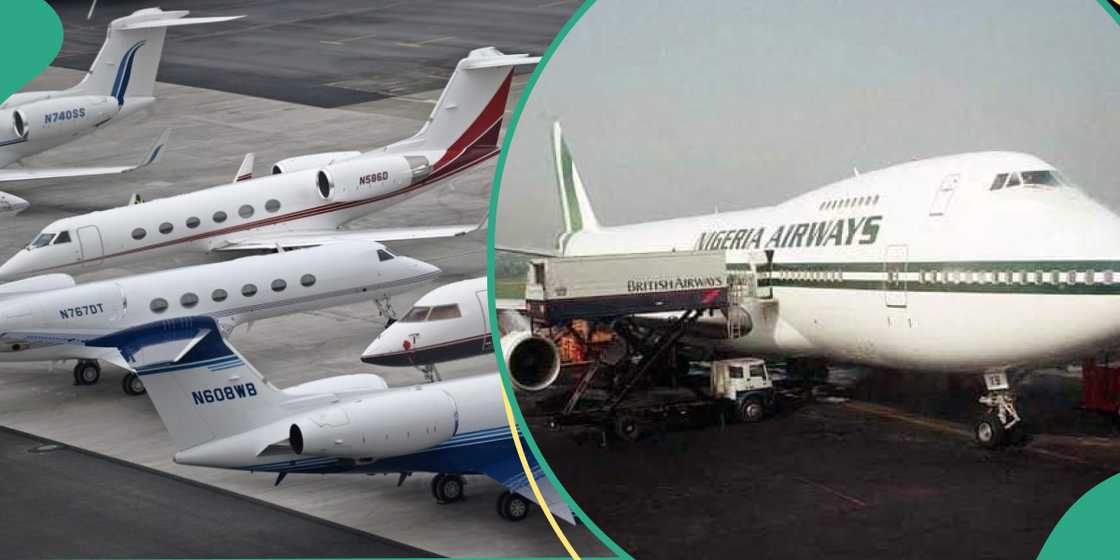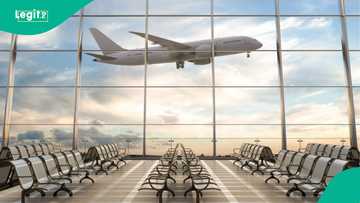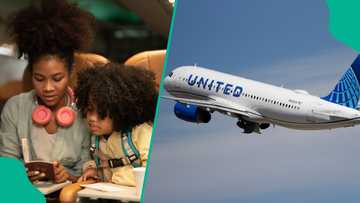Full List: Over 20 Airlines Shut Down in 24 Years Amid Nigeria's Aviation Industry Turmoil
- So many airlines have closed down operations in Nigeria due to the various challenges in the country's aviation industry
- While some shut down operations after operating for a few years, others have failed to launch a single flight
- Rotimi Akinola, an aviation analyst, attributed the collapse of some local airlines to a combination of factors
Legit.ng journalist Victor Enengedi has over a decade's experience covering Energy, MSMEs, Technology and the Stock Market.
In the past 24 years, at least 20 commercial airlines have ceased operations in Nigeria’s aviation industry.
Airlines like HAK Air, which acquired five Boeing 737 aircraft, shut down without conducting any flights after receiving their Airline Operator Certificate (AOC) from the Nigerian Civil Aviation Authority (NCAA).

Source: UGC
Some managed to operate for about a year. Various factors contributed to the collapse of these airlines, including government policy changes, lack of funds, and accidents, with some shutting down immediately after incidents or a few years later.

Read also
Air Peace: ACL reacts to FG’s threat to move Virgin Atlantic, British Airways to Ilorin Airport
PAY ATTENTION: Click “See First” under the “Following” tab to see Legit.ng News on your Facebook News Feed!
According to Independent report, airlines that disappeared during this period include Nigeria Airways, Albarka Air, Discovery Air, Air Midwest, Okada Air, EAS Airlines, NICON Airways, and ADC Airlines.
Others are Space World Airlines, First Nation, Hak Air, Slok Air, IRS Airlines, Air Nigeria, Nigerian Eagle, Associated Aviation, Chanchangi Airlines, Sosoliso Airlines, Bellview Airlines, and Virgin Nigeria.
Collapse of Nigeria's national carriers
Nigeria Airways, the former national carrier, operated from 1958 to 2003 before being shut down by President Olusegun Obasanjo in 2003.
Obasanjo was reportedly dissatisfied with the airline’s condition upon his return to office, stating that when he left the presidency in 1979, the airline had 29 functional aircraft, but two decades later, it was down to just two barely operational planes.
The airline’s closure sparked widespread criticism, particularly because its staff did not receive their terminal benefits until 2009, when President Umaru Yar’Adua paid five years' worth of severance packages with a promise to settle the remaining amount later.
However, it wasn't until December 2018, under President Muhammadu Buhari and then-Aviation Minister Sen. Hadi Sirika, that another 50% of the outstanding severance was paid.
Most recently, a planned national carrier, Nigeria Air, which was in partnership with Ethiopian Airlines, was riddled with so many controversies.
Recently, Nigeria Air, a proposed national carrier in collaboration with Ethiopian Airlines, faced numerous controversies.
Festus Keyamo, the minister of aviation and aerospace development, has now announced the indefinite suspension of the project, citing that the country's interests would not be served by the airline's ownership structure.
In a recent discussion with The Sun, Prof. Obiora Okonkwo, the CEO of United Nigeria Airline, expressed concerns that the nation's aviation industry is on "life support" and may struggle to endure the extremely challenging business conditions.
He said:
"I said two years ago that the sector is on a life support machine and is taking oxygen. The sector has been having an existential threat. What is keeping the new breed of operators like Air Peace is our level of resilience and patriotism. If we have to weigh our operations based on our profits and losses, we would have long closed shop."

Read also
Muritala Muhammed, P'Harcourt, others to get competitor as new international airport set to launch
No | Airline | Closed operations |
1 | Nigeria Airways | 2003 |
2 | ADC Airlines | 2006 |
3 | Sosoliso Airlines | 2006 |
4 | Associated Aviation | 2019 |
5 | Bellview Airlines | 2010 |
6 | Albarka Air | 2005 |
7 | Okada Air | 2002 |
8 | Space World Airlines | 2007 |
9 | Chanchangi | 2012 |
10 | Discovery | 2015 |
11 | First Nation | 2018 |
12 | IRS | 2013 |
13 | Slok Air | 2007 |
14 | Virgin Nigeria | 2009 |
15 | Nigerian Eagle | 2010 |
16 | Air Nigeria | 2012 |
17 | EAS Airlines | 2006 |
18 | NICON Airways | 2007 |
19 | Air Midwest | 2006 |
Why airlines are collapsing
Speaking with Legit.ng Rotimi Akinola, an aviation analyst, attributed the collapse of some local airlines to a combination of poor financial management, high operational costs, and inadequate government support.
He said:
"The volatile cost of aviation fuel, fluctuating exchange rates, and stiff competition make it difficult for airlines to maintain profitability. Also, infrastructure challenges like poorly maintained airports and inefficient air traffic control systems exacerbate operational difficulties.
"Frequent policy changes by the government and lack of access to affordable financing also hinder long-term growth. These factors create a challenging environment for airlines, leading to their collapse after a short period of operation."
Akinola, however, advised the government to save struggling airlines by providing financial support, ensuring stable aviation policies, reducing taxes on aviation fuel, and improving airport infrastructure.
Max Air suspends operations
In related news, Legit.ng reported that Nigerian airline Max Air announced the indefinite suspension of its domestic flight operations from Friday, August 2, 2024.
Max Air disclosed this in a statement, explaining that the decision to halt operations is due to the ongoing hunger protests in Nigeria.
The airline also promised continued support from its customer service through social media, email, and phone.
PAY ATTENTION: Stay Informed and follow us on Google News!
Source: Legit.ng




